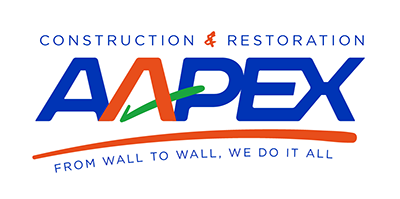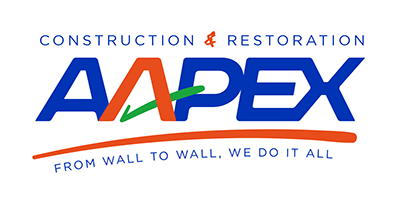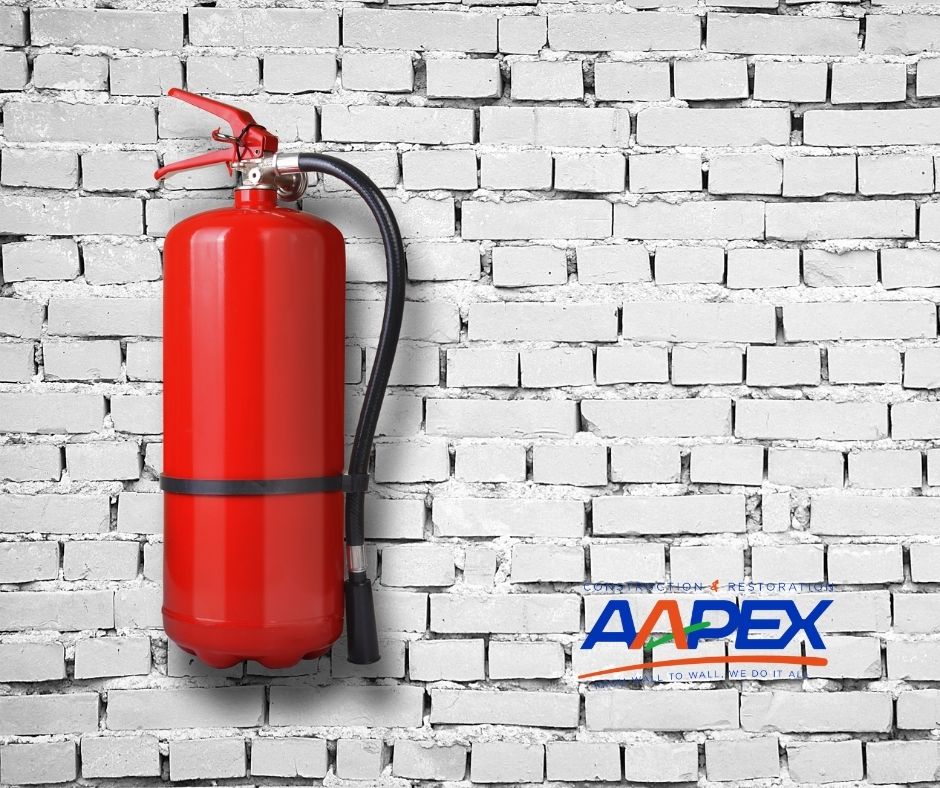As fire restoration specialists, we spend a lot of time talking about what to do after a fire. Just as important as that is knowing what to do before that can help prevent catastrophic loss or worse. Practice these fire safety and prevention tips to keep your home and your family safe!
Have a Plan Fire Safety Plan
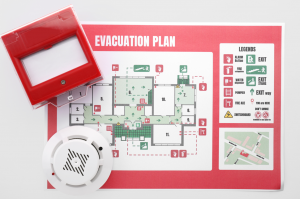 Home fires can spread incredibly quickly, sometimes giving you and your family as little as one to two minutes to reach safety before the home is engulfed in flames. Because of this, one of the most important fire safety tips is to have an evacuation plan and practice it with your family. Every person in your home should know at least two routes of escape from each room in your home, closing doors behind them as they go. This may mean investing in fire ladders for bedrooms on the second floor that do not otherwise have a safe or easy route out of the house should a fire block the path to the first floor. Be sure to have a plan for helping those who cannot easily reach safety on their own (such as infants or the elderly). A good evacuation plan will also designate where everybody should meet once they are out of the house.
Home fires can spread incredibly quickly, sometimes giving you and your family as little as one to two minutes to reach safety before the home is engulfed in flames. Because of this, one of the most important fire safety tips is to have an evacuation plan and practice it with your family. Every person in your home should know at least two routes of escape from each room in your home, closing doors behind them as they go. This may mean investing in fire ladders for bedrooms on the second floor that do not otherwise have a safe or easy route out of the house should a fire block the path to the first floor. Be sure to have a plan for helping those who cannot easily reach safety on their own (such as infants or the elderly). A good evacuation plan will also designate where everybody should meet once they are out of the house.
Not only is it important to have an evacuation plan, but also to practice that plan. You want every member of your household to be able to escape the home in under two minutes, so practicing with a stopwatch—even making it a race—is a good idea. It’s also a good idea for everybody in the home to know what to do if they can’t get out. This includes sealing the doors with towels or clothes to reduce the amount of smoke able to enter the room, opening the windows to allow the smoke in the room to clear out, and finding a way to signal where they are once the fire department arrives (with a flashlight or a cloth hanging from the window).
Have Fire Extinguishers & Know How to Use Them
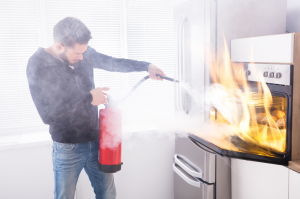
Every home should be equipped with a fire extinguisher on each level of the home, as well as one in the kitchen, the workshop, and the garage, where home fires often occur. Having a fire extinguisher close at hand, no matter where you are in the home, may mean the difference between a small, but contained, fire and a total loss. Be sure that your home fire extinguishers are properly rated for the types of fires you may have in your home, properly charged, and that you know how to operate them. Teach those old enough to operate a fire extinguisher to PASS:
- Pull the pin. Hold the extinguisher facing away from you and release the locking mechanism.
- Aim low. Point the extinguisher at the base of the fire.
- Squeeze the lever slowly and evenly.
- Sweep the nozzle from side-to-side.
Make sure your home’s extinguishers are easily accessible, with nothing blocking their path or hiding them from view. Regularly check that they are clean and operational, being sure they are properly charged. Many homeowners do this at the start and end of Daylight Savings Time at the same time they change their smoke detector batteries.
Close Your Doors
 One of the most effective ways to prevent the spread of fire in your home is to close your doors, especially when you are sleeping. Closing bedroom doors while you’re sleeping can buy your family time by shielding the sealed rooms from the fire, which could mean the difference between life and death. Because 50% of fires happen between 11 p.m. and 7 a.m., when the household is typically sleeping, closing your bedroom doors while you sleep is critically important. A fire needs oxygen to continue burning, closing the doors in your home limits how much “fuel” the fire can access. Beyond that, a closed door protects the sealed room, and everyone inside it, by keeping temperatures down (rising only to 100°F rather than 10,000°F) and carbon monoxide levels down to breathable levels. This video demonstrates the shocking difference a closed door can make.
One of the most effective ways to prevent the spread of fire in your home is to close your doors, especially when you are sleeping. Closing bedroom doors while you’re sleeping can buy your family time by shielding the sealed rooms from the fire, which could mean the difference between life and death. Because 50% of fires happen between 11 p.m. and 7 a.m., when the household is typically sleeping, closing your bedroom doors while you sleep is critically important. A fire needs oxygen to continue burning, closing the doors in your home limits how much “fuel” the fire can access. Beyond that, a closed door protects the sealed room, and everyone inside it, by keeping temperatures down (rising only to 100°F rather than 10,000°F) and carbon monoxide levels down to breathable levels. This video demonstrates the shocking difference a closed door can make.
Unplug Small Appliances
 In addition to being energy “vampires” when not in use, small appliances are also a common source of electrical fires. Household appliances, like coffeemakers and toaster ovens, continue to draw electricity when not in use. Cords can become pinched or wear out over time, potentially leading to a current overload or spark that may cause an electrical fire. Be sure to unplug all small appliances when not in use, especially before you leave the house or go to bed. When unplugging any device, always pull from the plug, never the cord. Using the cord to unplug something from the wall will cause the cord to wear out and fray, creating an electrical fire hazard.
In addition to being energy “vampires” when not in use, small appliances are also a common source of electrical fires. Household appliances, like coffeemakers and toaster ovens, continue to draw electricity when not in use. Cords can become pinched or wear out over time, potentially leading to a current overload or spark that may cause an electrical fire. Be sure to unplug all small appliances when not in use, especially before you leave the house or go to bed. When unplugging any device, always pull from the plug, never the cord. Using the cord to unplug something from the wall will cause the cord to wear out and fray, creating an electrical fire hazard.
Be Safe with Dishwashers & Laundry Appliances
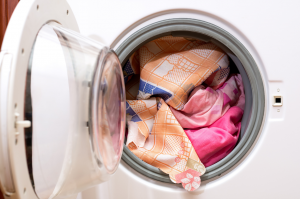 Dishwashers offer so much convenience, many people don’t give dishwashers and laundry appliances much thought when it comes to the potential fire hazards. All too often, people start up the dishwasher or dryer before leaving the house or heading to bed. However, dishwashers and laundry appliances are common sources of home fires. The heating elements within dishwashers can wear out, causing a short that may overload the circuit or cause a spark. Dryers account for nearly 3,000 residential fires each year, most often as a result of lint blocking airflow through the vents. Be safe with these appliances and only operate them when you are home and awake. Also, be sure to empty the lint trap in your dryer every time you run it and to periodically check to make sure the vent from the dryer is clear of any blockages.
Dishwashers offer so much convenience, many people don’t give dishwashers and laundry appliances much thought when it comes to the potential fire hazards. All too often, people start up the dishwasher or dryer before leaving the house or heading to bed. However, dishwashers and laundry appliances are common sources of home fires. The heating elements within dishwashers can wear out, causing a short that may overload the circuit or cause a spark. Dryers account for nearly 3,000 residential fires each year, most often as a result of lint blocking airflow through the vents. Be safe with these appliances and only operate them when you are home and awake. Also, be sure to empty the lint trap in your dryer every time you run it and to periodically check to make sure the vent from the dryer is clear of any blockages.
Trust Aapex Construction & Restoration to Restore Your Home after a Fire
Have you suffered a fire loss? Aapex Construction & Restoration is a locally owned and operated company that specializes in insurance and non-insurance restoration projects, both commercial and residential. With more than 20 years of experience in the industry, we pride ourselves on exceeding our clients’ expectations when it comes to quality, attention to detail, and customer service. Our goal is to assist you in every possible way, including acting as your advocate with the insurance company as we restore your property to pre-loss conditions. Contact us today for a consultation.
Related Articles
The 6 Most Common Causes of House Fires
What Does It Mean to Be an Insurance Company’s “Preferred Vendor”?
